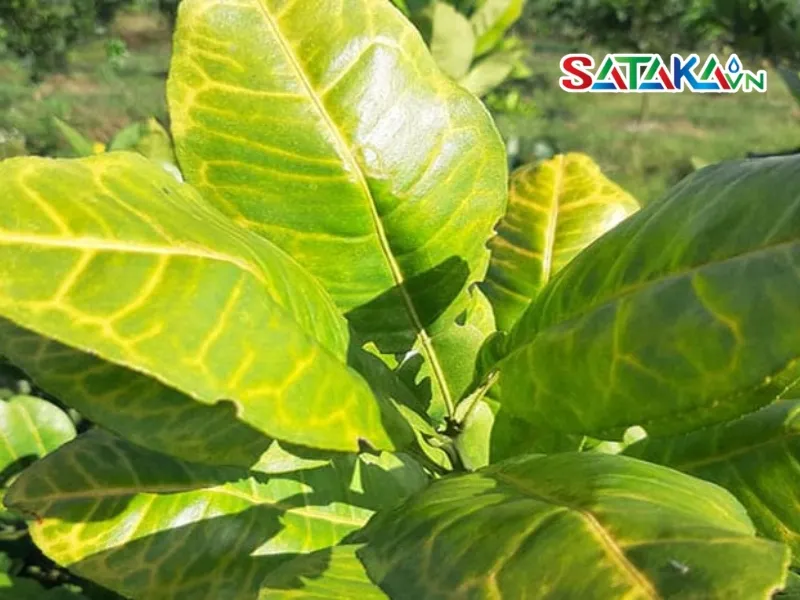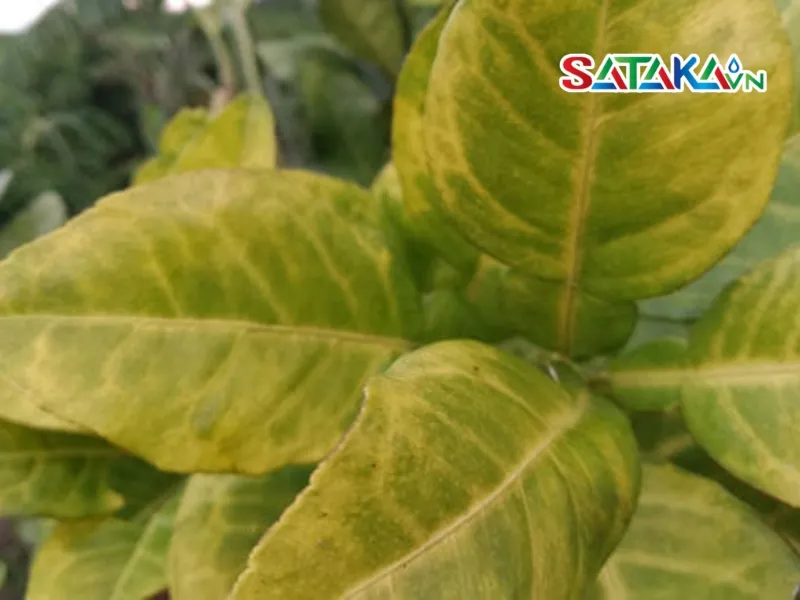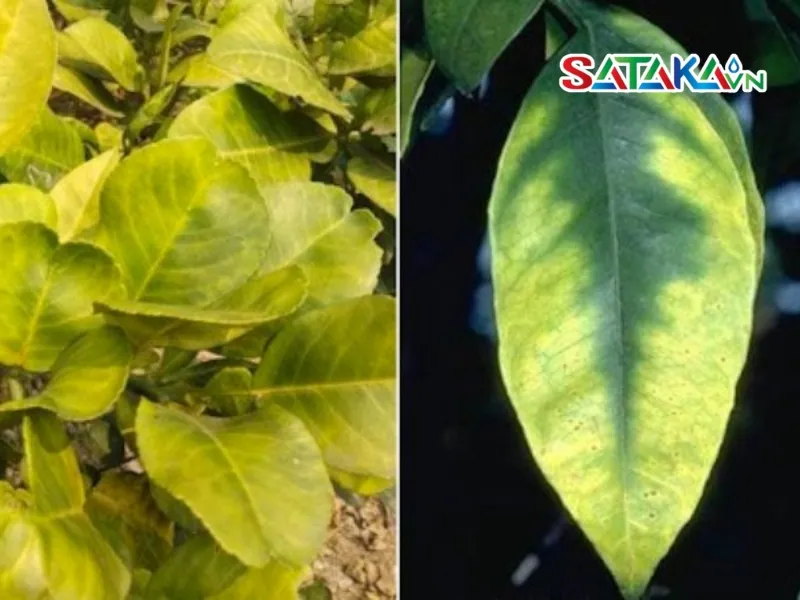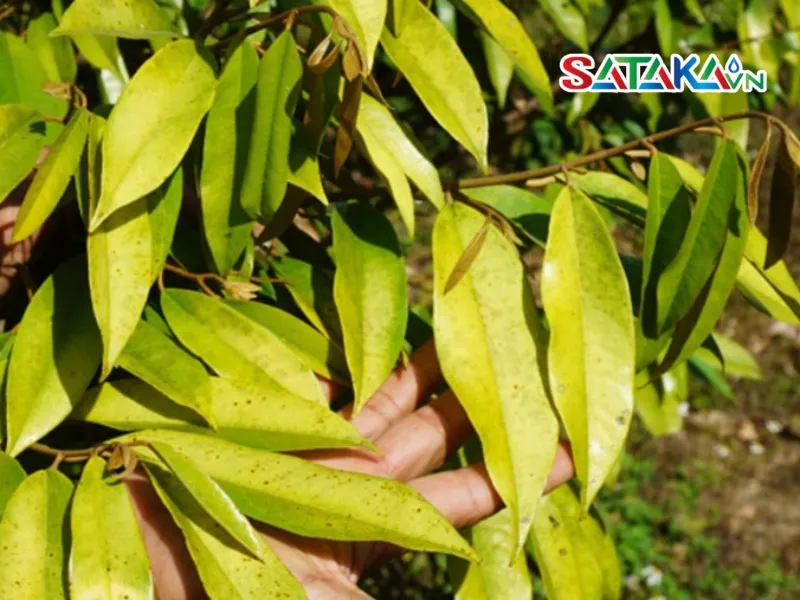Leaf and root rot disease causes serious damage to plants, causing yellowing leaves and rotting roots, reducing plant productivity. Join Sataka to learn effective prevention measures to protect trees.
Yellow leaf and root rot disease is one of the most dangerous and common diseases affecting durian trees, causing significant damage to growers. This disease not only reduces yields but also greatly impacts fruit quality. In this article, we provide detailed information on the conditions that promote the disease, its symptoms, and effective prevention and control measures.
Yellow leaf and root rot is a common disease that causes severe damage to durian trees. The primary culprits are harmful fungi and bacteria, particularly Fusarium oxysporum and Phytophthora spp. These fungi thrive in wet conditions and poorly aerated soils, making durian trees vulnerable to attack. As a result, symptoms such as yellowing leaves and root rot develop.

Harmful agent of yellow leaf and root rot disease
The disease tends to thrive in humid weather, especially during the rainy season. Heavy rainfall and high humidity create favorable conditions for fungi and bacteria to grow. This is particularly true for Fusarium oxysporum and Phytophthora spp., which flourish in high soil moisture and ideal temperatures ranging from 20°C to 30°C.

Conditions that give rise to this disease
Additionally, improper watering practices or the use of contaminated water contribute to the risk of yellow leaf and root rot. Overwatering leads to waterlogged soil, which hinders proper drainage and creates a conducive environment for fungi and bacteria to thrive. Compacted soil or heavy clay soil with poor aeration is also a significant factor, as these soils retain water for extended periods, promoting pathogen growth.
When a durian tree is infected with yellow leaf and root rot, the first noticeable symptom is yellowing leaves. This process usually starts with older leaves near the base of the tree and gradually spreads to younger leaves. The yellowing is most prominent along the leaf veins before extending to the entire leaf. If left untreated, the leaves will eventually fall, leaving the tree bare and weak.
Another hallmark of the disease is rotting roots. Infected roots become soft, brown-black, and emit a foul odor. Upon examination, both primary and secondary roots appear decayed, losing their firmness and severely impairing the tree's ability to absorb water and nutrients.

Symptoms appear in durian trees when sick
Additionally, infected trees may develop mushy, brown-black lesions on the trunk, especially around the base and main roots. These lesions can spread rapidly if not addressed in time. The tree weakens, growth slows, and in severe cases, the tree may die without timely intervention.
Correct watering is crucial to prevent yellow leaf and root rot. Avoid overwatering and frequently check soil moisture levels to adjust irrigation appropriately. Watering in the early morning is recommended, as it allows the tree to absorb water while avoiding prolonged wet conditions overnight.
Using safe and effective fungicides and bactericides is an essential measure to control the development of pathogens. These products should be applied according to the manufacturer's instructions. Choose fungicides with clear origins to ensure safety for both the plant and humans.

The most effective way to prevent disease
Yes, with early detection and the application of appropriate treatments, an infected durian tree can recover. Using fungicides, improving soil conditions, and proper watering practices are critical steps for tree recovery. Consult experts or trusted providers like Sataka for specific guidance.
Enhance soil quality by incorporating organic and microbial fertilizers to increase aeration and drainage. Regular soil amendments can reduce the risk of yellow leaf and root rot. Additionally, soil conditioners from reputable suppliers like Sataka can be an effective solution.
The disease is primarily caused by fungi like Fusarium oxysporum and Phytophthora spp., which thrive in wet, poorly aerated soil. Improper watering practices and the use of contaminated water also contribute to the problem.
There are many effective fungicides available for treating yellow leaf and root rot. However, it is essential to select products with a clear origin and follow recommendations from agricultural experts. Sataka offers safe and effective fungicides—contact them for detailed advice.
Yes, intercropping can improve soil aeration and reduce the risk of disease transmission between trees. It also helps maintain soil fertility and prevents nutrient depletion. Select suitable crops for intercropping and maintain good garden hygiene to minimize pathogen development.
Yellow leaf and root rot disease poses a significant threat to durian trees. However, with proper prevention and control measures, you can effectively manage and prevent the spread of this disease. To achieve the best results, choose disease control products from trusted suppliers.
Sataka Vietnam is proud to offer high-quality, safe, and effective disease control solutions. Contact us today for expert advice and support in caring for and protecting your durian orchard from this disease!